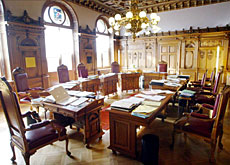
Rightwing power bid gathers momentum

All the parties in government, with the exception of the Christian Democrats, say they are ready to discuss the idea of a second cabinet seat for the rightwing People’s Party.
Such an eventuality is no longer ruled out by the media, following the resounding success of the Right in Sunday’s parliamentary elections.
The big losers on Sunday were the centre-right Christian Democrats, who are now under pressure to hand over one of their two cabinet seats to the People’s Party.
The People’s Party, which has been steadily growing in strength since the 1990s, is now the strongest force in the 200-strong House of Representatives, after it won the largest share of the vote.
The party gained 26.6 per cent of the vote, up four per cent on the 1999 elections. It also grabbed an additional 11 seats in the House of Representatives, taking its total up to 55.
“We are clearly targeting the Christian Democrats’ seat,” said party spokesman Yves Bichsel.
“We want to bring together in the cabinet the strongest parties, because there are numerous problems to solve in this country. The Left also has to be represented in the government.”
Extra seat
The centre-right Radicals have admitted that the People’s Party’s demands for an additional seat have gained more weight after Sunday – a view held also by the centre-left Social Democrats.
“The party’s representation in government should reflect its electoral strength,” said Reto Gamma, secretary-general of the Social Democrats.
Given its victory in the elections, political analyst Claude Longchamp, believes the People’s Party has a right to a second seat.
“[It] is quite reasonable if you consider Sunday’s result and the outcome of the elections four years ago.”
This would mean changing the “Magic Formula” – Switzerland’s power-sharing arrangement set up in 1959 – which grants two cabinet seats each to the Christian Democrats, Social Democrats and Radicals, and one to the People’s Party.
The division of seats under the “Magic Formula” was based on the popularity of the parties – at the time the People’s Party was the weakest of the four major parties.
But all that changed during the 1990s as the People’s Party won a larger share of the vote.
Weakest party
Ahead of December’s cabinet nominations, the most likely option is for the weakest of the major parties, the Christian Democrats – which won only 14.4 per cent of the vote – to give up one of their seats.
Many election analysts, including Longchamp, believe this would be the easiest solution.
“It would then be up to the Radicals and the Social Democrats to accept such a move,” he said.
“The People’s Party and the Radicals together do not form a majority in the newly elected House, which could make it difficult for them to push something through.
“They would have to get the tacit approval of the Social Democrats if they wanted to act against the Christian Democrats.”
The People’s Party has threatened to go into opposition if it does not get a second seat, but analysts say this would be unlikely to happen.
On Sunday the party said billionaire industrialist Christoph Blocher would be standing in December’s cabinet elections.
The hardliner is a divisive figure, and some analysts have suggested that a less controversial candidate might aid the People’s Party’s chances of a second cabinet seat.
swissinfo with agencies
The Swiss People’s Party won 26.6% of the popular vote, and now has 55 seats in the House of Representatives.
Social Democrats: 23.3% with 52 seats.
Radicals: 17.3% with 36 seats.
Christian Democrats: 14.4% with 28 seats.

In compliance with the JTI standards
More: SWI swissinfo.ch certified by the Journalism Trust Initiative




























You can find an overview of ongoing debates with our journalists here . Please join us!
If you want to start a conversation about a topic raised in this article or want to report factual errors, email us at english@swissinfo.ch.